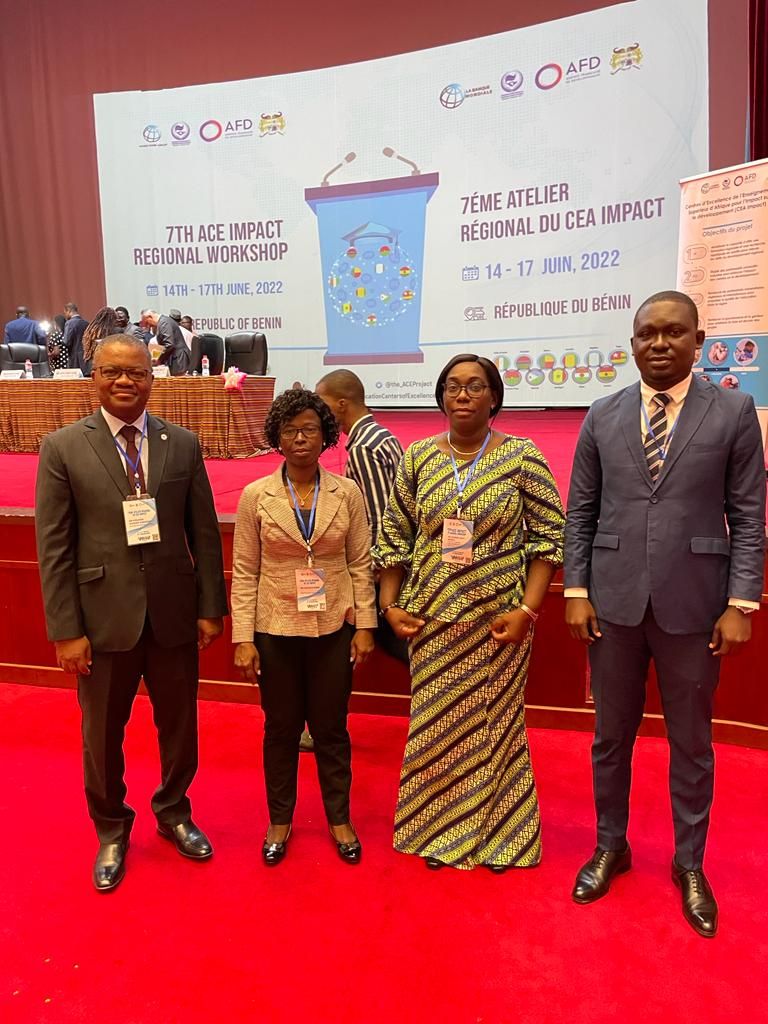
Since Tuesday 14 June 2022, a delegation from ENSEA led by its Director, Dr. Hugues KOUADIO is in Cotonou, Benin to participate in the 7th biannual regional workshop of the Centres of Excellence in Higher Education in Africa for Development Impact (CEA Impact) organised by AFD, the World Bank and AAU.
This physical meeting after the one in Abuja in February 2020, is the first one since the Covid 19 pandemic that shook the world.
ENSEA Abidjan is represented by a delegation of four people including the Project Coordinator Dr. Hugues KOUADIO, the Deputy Coordinator Dr. BOMISSO MOSSO Rosine, the Monitoring and Evaluation Officer Dr. SORO Nahoua and the Procurement Specialist Mr. YAPO Loess Pacôme.
The Centres of excellence in higher education in Africa met from 14 to 17 June to strengthen the will to have an impact on development.
The opening of this 7th workshop was made by Professor Eléonore Yayi Ladekan, Minister of Higher Education and Scientific Research of the Republic of Benin at the Palais des Congrès in Cotonou on 14 June 2022.
The objective of this 7thACE Impact Regional Workshop was to provide a platform for the Centres of Excellence to exchange information on their respective programmes, and to forge partnerships to ensure the successful implementation of the project for the benefit of African students and faculty, scientific research, industry and other key sectors of the economy. The main stakeholders, namely the World Bank, the French Development Agency (AFD), the Association of African Universities (AAU), and the Centres had the opportunity to exchange and make a mid-term assessment of the activities and implementation of the ACE 1 and ACE Impact projects, to understand the investments, the impact and the results obtained in line with the project objectives.
As a reminder, ENSEA was awarded the African Centre of Excellence (ACE) label for training in statistics and applied economics in 2015 by the World Bank due to the quality of the training provided. The objectives of this project revolve around the following four major axes
- Achieving excellence in teaching/learning
- Achieving excellence in research
- Achieving excellence by integrating equity and attractiveness
- Achieving excellence through management and good governance
The performance of ENSEA at the end of this first project has led to the renewal of the project within the framework of the African Centre of Excellence in Higher Education for Development Impact (ACE Impact) for the period 2020-2024 with joint funding from the World Bank and AFD.
Information on the ACE Impact project
The ACE Impact project is a $350 million initiative by the World Bank and $78 million by the French Development Agency in collaboration with the governments of participating countries to support 53 Centres hosted by higher education institutions to specialize in the fields of science technology, engineering and mathematics (STEM), agriculture, social sciences, education, transport and health in Benin, Burkina Faso, Côte d'Ivoire, Djibouti, Gambia, Ghana, Guinea, Niger, Nigeria, Senegal and Togo. In addition, Phase II of the ACE project, hosted by the Inter-University Council of East Africa, covers 24 Centres in Ethiopia, Kenya, Malawi, Mozambique, Rwanda, Tanzania, Uganda and Zambia.
The project aims to strengthen the capacity of participating universities to deliver high quality training and applied research, and to meet the demand for skills needed for Africa's development. Thematic areas of the ACE Impact project also include sustainable cities, sustainable energy, health and population policy, herbal medicine development and regulatory sciences, public health, applied informatics and communication, and pastoral production.
The funding of the 53 Centres of excellence is designed as a government programme to which the World Bank and/or AFD provide funds. The ACE Impact project uses government and institutional budgets, agreed rules, and a focus on strengthening government and institutional oversight for its implementation. The World Bank and/or AFD finance an agreed amount of this programme if the results are achieved and the agreed fiduciary and safeguard rules and standards are met.
The financial contributions from governments and institutions correspond to the value of the estimated salaries and operational costs for the implementation of the Centres of Excellence. The amount of disbursements from the credit depends on the satisfactory achievement of agreed and pre-specified progress in programme implementation and performance results, called Disbursement Linked Indicators (DLIs). Each DLI has a unit disbursement price per unit of result achieved. Reporting and verification of the achievement of DLIs and disbursements is done periodically at agreed times. Disbursements reimburse countries for selected ACE Impact project expenditures and are called Eligible Expenditure Programmes (EEPs).
#CEA_ENSEA #7thACEImpact #ACEImpact #he_ACEProject

